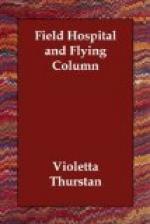The hospital that we had to improvise at the fire-station was one of the most interesting pieces of work we had to do in Brussels. There were 130 beds altogether in six large wards, and the Sisters had to sleep at first in one, later in two large dormitories belonging to firemen absent on active service. The firemen who were left did all the cooking necessary for the nursing staff and patients, and were the most charming of men, leaving nothing undone that could augment the Sisters’ comfort.
It is a great strain on temper and endurance for women to work and sleep and eat together in such close quarters, and on the whole they stood the test well. In a very few days the fire-station was transformed into a hospital, and one could tell the Sisters with truth that the wards looked almost like English ones. Alas and alas! At the end of the week the Germans put in eighty soldiers with sore feet, who had over-marched, and the glorious vision of nursing Tommy Atkins at the front faded into the prosaic reality of putting hundreds of cold compresses on German feet, that they might be ready all the sooner to go out and kill our men. War is a queer thing!!
* * * * *
On the following Tuesday afternoon the Burgomaster of Charleroi came into Brussels in an automobile asking for nurses and bringing with him a permit for this purpose from the German authorities. Charleroi, which was now also in German hands, was in a terrible state, and most of the city burnt down to the ground. It was crammed with wounded—both French and German—every warehouse and cottage almost were full of them, and they were very short of trained people.
The Central Red Cross Bureau sent a message, asking if three of us would go back with him. Would we! Was it not the chance we had been longing for. In ten minutes Sister Elsie, Sister Grace and I were in that automobile speeding to Charleroi. I had packed quickly into a portmanteau all I thought I was likely to want in the way of uniform and other clothing, with a few medical comforts for the men, and a little tea and cocoa for ourselves. The two Sisters had done likewise—so we were rather horrified when we got to Hal, where we had to change automobiles, the Burgomaster said he could not possibly take any of our luggage, as we must get into quite a small car—the big one having to return to Brussels. He assured us that our things would be sent on in a few days—so back to Brussels went my portmanteau with all my clean aprons and caps and everything else, and I did not see it again for nearly a week. But such is war!




